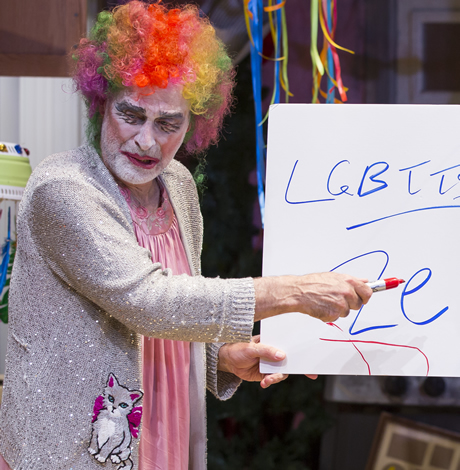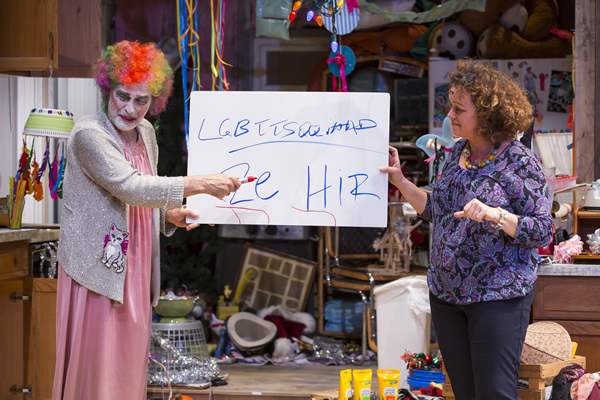Music & Concerts
Messy familial dysfunction handled adroitly in Woolly’s ‘Hir’
Resentment, sadness, anger and sadistic cruelty make for a memorable and often uncomfortable theatrical experience


Mitch Hebert and Emily Townley in ‘Hir.’ (Photo by Scott Suchman; courtesy Woolly Mammoth)
‘Hir’
Through June 18
Woolly Mammoth Theatre Company
641 D St., N.W.
$35 and up
202-393-3939
Woolly Mammoth is never afraid to go there. In the company’s unsettling and exceedingly well-acted production of Taylor Mac’s dark comedy “Hir,” a hideously dysfunctional family becomes scarily relatable. That their resentment, sadness, anger and even flashes of sadistic cruelty are frequently recognizable makes for a memorable and often uncomfortable theatrical experience.
After serving an overseas stint in the Marine Corps assigned to Mortuary Affairs Unit, Isaac (Joseph J. Parks) returns home seeking the familiar but what he finds is anything but. The formerly orderly, modest house is a mess. His once despotic father Arnold (Mitch Hébert) has suffered a stroke and has lost the ability to hold the family in his abusive grip. Isaac’s mother Paige (Emily Townley), Arnold’s longtime punching bag, is now in charge and for her that means subverting the patriarchy. She dresses her disabled husband in a woman’s pink nightgown and feeds him smoothies laced with estrogen to keep him docile. He sleeps in a box in the living room.
Isaac’s 16-year-old sister Max is now a wispy, whiskered transgender anarchist who uses the pronouns ze and hir (pronounced here). Max is played as a precocious, though typically self-involved, teen by Malic White whose real life pronouns are they/them/theirs. With Arnold no longer able to push them around, Paige and Max are exploring arts, culture and shifting the paradigm. Paige has hitched her wagon to her son’s dreams. There’s humor here but it’s never too far removed from tragedy
We soon learn that Isaac was dishonorably discharged after caught doing crystal meth. Paige is more curious than angry. She loves her son and is happy to have him home, but she insists he follow her new protocol. Her rules are designed to make her husband miserable: No cooking. No cleaning. No TV. Keep the air conditioning on high. And no empathy whatsoever is to be shown toward Arnold.
While Isaac acknowledges his father’s failings and history of abusive behavior in a poignant monologue, he still longs for order and some sort of patriarchal structure. So inevitably a battle of wills ensues. And while Paige revels in her new-found liberty, she remains mired in a sick living situation. And she’s not afraid to fight dirty when her way of life is threatened. Adeptly and fearlessly led by director by Shana Cooper, the talented actors superbly convey the family dynamics and baggage that such a mother/son struggle entails.
Adding to the family’s general disappointment is their longtime home, a starter house built atop a landfill, marvelously realized by set designer Misha Kachman. After living in the house for decades, the interior is still unfinished. There’s exposed insulation and framing, and by Paige’s design, a colorful mess of colossal proportion comprised of assorted junk, toys, piles of laundry, a doll house made from toilet paper cardboard tubes and a Christmas tree.
Playwright Taylor Mac, who uses judy (lowercase) as a gender pronoun, began writing “Hir” years ago, yet the work is particularly timely. The playwright describes divisive politics and explores whether people with different politics can ever truly coexist. Are different opinions acceptable? Is it imperative to compromise to heal? After years of abuse is healing even achievable? “Hir” asks these questions and more.
Music & Concerts
Musical icons and newer stars to rock D.C. this spring
Brandi Carlile, Bad Bunny, Nicki Minaj, and more headed our way

Bands and solo artists of all different genres are visiting D.C. this spring. Patti LaBelle and Gladys Knight will team up to perform at the Wolf Trap in June, and girl in red will play at the Anthem in April. Some artists and bands aren’t paying a visit until the summer, like Janet Jackson and Usher, but there are still plenty of acts to see as the weather warms up.
MARCH
Brandi Carlile plays at the Anthem on March 21; Arlo Parks will perform at 9:30 Club on March 23; Girlschool will take the stage at Blackcat on March 28.
APRIL
Nicki Minaj stops in D.C. at Capital One Arena as part of her North American tour on April 1; Bad Bunny plays at Capital One Arena on April 9 as part of his Most Wanted tour; girl in red performs at the Anthem on April 20 and 21; Brandy Clark plays at the Birchmere on April 25; Laufey comes to town to play at the Anthem on April 25 and 26.
MAY
Belle and Sebastian play at the Anthem on May 2; Chastity Belt performs at Blackcat on May 4; Madeleine Peyroux stops at the Birchmere on May 5; The Decemberists play at the Anthem on May 10; the rock band Mannequin Pussy performs at the Atlantis on May 17 and 18; Hozier plays at Merriweather Post Pavilion on May 17 as part of the Unreal Unearth tour.
JUNE
Patti LaBelle and Gladys Knight will sing soulful melodies at Wolf Trap on June 8; Joe Jackson performs at the Lincoln Theatre on June 10; the Pixies and Modest Mouse are teaming up to play at Merriweather Post Pavilion on June 14; Maggie Rogers plays at Merriweather Post Pavilion on June 16 as part of The Don’t Forget Me tour; Brittany Howard headlines the Out & About Festival at Wolf Trap on June 22; Sarah McLachlan plays at Merriweather Post Pavilion on June 27; Alanis Morissette performs at Merriweather Post Pavilion on June 29 and 30
Music & Concerts
Grammys: Queer women and their sisters took down the house
Taylor Swift won Album of the Year

When the late, great Ruth Bader Ginsburg was asked when there will be enough women on the Supreme Court, her answer was simple: Nine. She stated: “I say when there are nine, people are shocked. But there’d been nine men, and nobody’s ever raised a question about that.” RBG did not attend the Grammy’s last night, but her spirit sure did. Women, at long last, dominated, ruled and killed the night.
Cher, in song a decade ago, declared that “this is a woman’s world,” but there was little evidence that was true, Grammy, and entertainment awards, speaking. In 2018, the Grammys were heavily criticized for lack of female representation across all categories and organizers’ response was for women to “step up.”
Be careful what you wish for boys.
The biggest star of the 2024 Grammys was the collective power of women. They made history, they claimed legacy and they danced and lip sang to each other’s work. Standing victorious was Miley Cyrus, Billie Eilish, SZA (the most nominated person of the year), Lainey Wilson, Karol G, boygenius, Kylie Minogue and Victoria Monét. Oh, yes, and powerhouse Taylor Swift, the superstar from whom Fox News cowers in fear, made history to become the first performer of any gender to win four Best Album of the Year trophies.
In the throng of these powerful women stand a number of both LGBTQ advocates and queer identifying artists. Cyrus has identified as pansexual, SZA has said lesbian rumors “ain’t wrong,” Phoebe Bridgers (winner of four trophies during the night, most of any artist) is lesbian, Monét is bi and Eilish likes women but doesn’t want to talk about it. Plus, ask any queer person about Swift or Minogue and you are likely to get a love-gush.
Women power was not just owned by the lady award winners. There were the ladies and then there were the Legends. The first Legend to appear was a surprise. Country singer Luke Combs has a cross-generational hit this year with a cover of Tracy Chapman’s “Fast Car.” When originally released, the song was embraced as a lesbian anthem. When performing “Fast Car,” surprise, there was Chapman herself, singing the duet with Combs. The rendition was stunning, sentimental and historic.
Chapman, like many of the night’s female dignitaries, has not been public with her sexuality. Author Alice Walker has spoken of the two of them being lovers, however.
The legend among legends of the night, however, was the one and only Joni Mitchell. Not gay herself, she embodies the concept of an LGBTQ icon, and was accompanied by the very out Brandi Carlile on stage. On her website, Mitchell’s statement to the LGBTQ community reads, “The trick is if you listen to that music and you see me, you’re not getting anything out of it. If you listen to that music and you see yourself, it will probably make you cry and you’ll learn something about yourself and now you’re getting something out of it.”
Mitchell performed her longtime classic “Both Sides Now.” The emotion, insight and delivery from the now 80-year old artist, survivor of an aneurism, was nothing short of profound. (To fully appreciate the nuance time can bring, check out the YouTube video of a Swift lookalike Mitchell singing the same song to Mama Cass and Mary Travers in 1969.) In this latest rendition, Mitchell clearly had an impact on Meryl Streep who was sitting in the audience. Talk about the arc of female talent and power.
That arc extended from a today’s lady, Cyrus, to legend Celine Dion as well. Cyrus declared Dion as one of her icons and inspirations early in the evening. Dion appeared, graceful and looking healthy, to present the final, and historic, award of the night at the end of the show.
Legends did not even need to be living to have had an effect on the night. Tributes to Tina Turner and Sinead O’Conner by Oprah, Fantasia Barrino-Taylor and Annie Lennox respectively, proved that not even death could stop these women. As Lennox has musically and famously put it, “Sisters are doing it for themselves.”
Even the content of performances by today’s legends-in-the-making spoke to feminine power. Eilish was honored for, and performed “What Was I Made For?,” a haunting and searching song that speaks to the soul of womanhood and redefinition in today’s fight for gender rights and expression, while Dua Lipa laid down the gauntlet for mind blowing performance with her rendition of “Houdini” at the top of the show, Cyrus asserted the power of her anthem “Flowers” and pretty much stole the show.
Cyrus had not performed the song on television before, and only three times publicly. She declared in her intro that she was thrilled over the business numbers the song garnered, but she refused to let them define her. As she sang the hit, she scolded the audience, “you guys act like you don’t know the words to this song.” Soon the woman power of the room was singing along with her, from Swift to Oprah.
They can buy themselves flowers from now on. They don’t need anyone else. Cyrus made that point with the mic drop to cap all mic drops, “And I just won my first Grammy!” she declared as she danced off stage.
Even the squirmiest moment of the night still did not diminish the light of women power, and in fact, underscored it. During his acceptance of the Dr. Dre Global Impact Award, Jay-Z had a bone to pick with the Grammy voters. He called out the irony that his wife Beyoncé had won more Grammys than any other human, but had never won the Best Album of the Year. Yeah, what’s with that?
But then, it brought additional context ultimately to the fact that the winner of the most Grammys individually … is a woman. And to the fact that the winner of the most Best Album of the Year awards … is a woman.
Hopefully this was the night that the Grammys “got it.” Women are the epicenter of The Creative Force.
Will the other entertainment awards get it soon as well? We can hope.
Most importantly, in a political world where women’s healthcare is under siege. Will the American voters get it?
A little known band named Little Mix put it this way in their 2019 song “A Woman’s World.”
“If you can’t see that it’s gotta change
Only want the body but not the brains
If you really think that’s the way it works
You ain’t lived in a woman’s world
Just look at how far that we’ve got
And don’t think that we’ll ever stop…”
From Grammy’s mouth to the world’s ear.
Music & Concerts
Janet Jackson returning to D.C, Baltimore
‘Together Again Tour’ comes to Capital One Arena, CFG Bank Arena

Pop icon Janet Jackson announced this week an extension of her 2023 “Together Again Tour.” A new leg of the tour will bring Jackson back to the area for two shows, one at D.C.’s Capital One Arena on Friday, July 12 and another at Baltimore’s CFG Bank Arena on Saturday, July 13.
Tickets are on sale now via TicketMaster. LiveNation announced the 2023 leg of the tour consisted of 36 shows, each of which was sold out. The 2024 leg has 35 stops planned so far; R&B star Nelly will open for Jackson on the new leg.
Jackson made the tour announcement Tuesday on social media: “Hey u guys! By popular demand, we’re bringing the Together Again Tour back to North America this summer with special guest Nelly! It’ll be so much fun!”
-

 District of Columbia4 days ago
District of Columbia4 days agoNew D.C. LGBTQ+ bar Crush set to open April 19
-

 District of Columbia5 days ago
District of Columbia5 days agoReenactment of first gay rights picket at White House draws interest of tourists
-

 Arizona5 days ago
Arizona5 days agoAriz. governor vetoes anti-transgender, Ten Commandments bill
-

 South America3 days ago
South America3 days agoDaniel Zamudio murderer’s parole request denied












